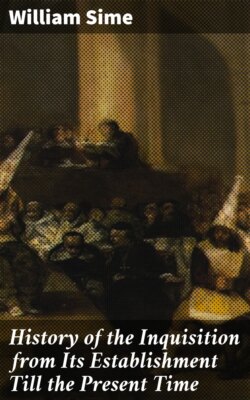History of the Inquisition from Its Establishment Till the Present Time

Реклама. ООО «ЛитРес», ИНН: 7719571260.
Оглавление
William Sime. History of the Inquisition from Its Establishment Till the Present Time
History of the Inquisition from Its Establishment Till the Present Time
Table of Contents
CHAPTER I
FOOTNOTES:
CHAPTER II
FOOTNOTES:
CHAPTER III
FOOTNOTE:
CHAPTER IV
FOOTNOTES:
CHAPTER V
FOOTNOTES:
CHAPTER VI
FOOTNOTES:
CHAPTER VII
FOOTNOTES:
CHAPTER VIII
CHAPTER IX
FOOTNOTES:
Отрывок из книги
William Sime
Published by Good Press, 2019
.....
Under the protection of Philip, the Inquisition flourished also in Sicily and Malta. The audacity of the Inquisitors in Sicily had formerly raised a rebellion, which was not quelled without the greatest difficulty. Depending, however, on the court of Madrid, and supposing that all fear of the rebellion had ceased, the Inquisitors of Sicily celebrated an auto-da-fé in 1546, in which four persons were burnt in effigy. Similar ceremonies took place in 1549 and 1551. The Inquisitors now became as insolent as formerly, and treated the Sicilians of all ranks with so much severity, that a new rebellion was raised in Palermo. The viceroy succeeded in restoring tranquillity, and the Inquisitors, while under the influence of fear, were for some time more moderate, celebrating their autos-da-fé privately in the hall of the tribunal.
In regard to Malta, again, when that island belonged to the Spanish monarchy, it was subject to the Inquisition of Sicily; "but when it was given to the knights of Jerusalem," says Llorente, "it would have been contrary to the dignity of the grand-master, to permit the exercise of foreign jurisdiction in it, after having received that of ecclesiastical power from the Pope. A man was arrested in the island as a heretic, and the Inquisition of Sicily took informations on the affair. The grand-master wrote to demand them; the Inquisitors consulted the council which directed them, in 1575, not only to refuse them, but to claim the prisoner. The grand-master resolved to defend his privi leges, caused the man to be tried in the island, and he was acquitted. This act displeased the Inquisitors, who, to revenge themselves, took advantage of an occurrence which took place in the following year. Don Pedro de la Roca, a Spaniard, and a knight of Malta, killed the first alguazil of the Sicilian Inquisition, in the city of Messina. He was arrested and conducted to the secret prisons of the holy office. The grand-master claimed his knight, as he alone had a right to try him. The council being consulted, commanded the Inquisitors to condemn and punish the accused as a homicide. The Inquisitor-general communicated this resolution to Philip II., who wrote to the grand-master to terminate the dispute."
.....